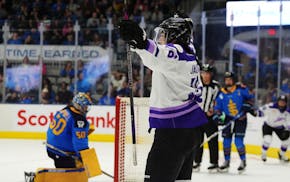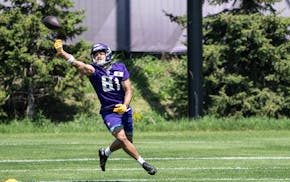Zack Littell didn't have his best stuff at Tampa Bay back on May 30 and he knew it. He relieved Martin Perez, who was already trailing 6-0, and got the final out in the third inning, but then allowed the Rays to score five runs in the fourth.
And then his day got even worse: Twins manager Rocco Baldelli sent him back out to pitch the fifth inning, too. "That's when you know," Littell said. "You're going to pitch, your pitch count is going to go up, and then you're done."
Yes, Littell is a frequent flyer on the Fresh Arm Express. The Twins officially carry seven or eight relief pitchers on their active roster, but it's actually more like 11 or 12 because, like most teams these days, they use the 25th roster spot like a reserved parking space: It's available to lots of people, but just one at a time.
"I definitely feel like part of the team," Littell said. "I'm just not here all the time."
The Twins have called up 14 pitchers from Class AAA Rochester this season, and most of them more than once, a total of 32 promotions so far. Littell is in his fourth stint, Devin Smeltzer has come up four times, too, and Tyler Duffey is here for the third time this year. There is one nonstop flight a day from Rochester, N.Y., to the Twin Cities, a Delta flight that departs at 6:44 a.m., and Duffey once joked that he had become friends with the crew from seeing them so often.
But nobody books that flight more frequently than Kohl Stewart, who has joined the Twins six times this season — but stayed more than two days just once.
"I'm not complaining. We all know this is the reality of this business," Stewart said Wednesday, when he flew to Minnesota just after sunrise, pitched the final three innings of an afternoon loss to Atlanta, and was sent back to Rochester less than eight hours after he arrived. "I don't want to say you get immune to it, but it's certainly not a surprise anymore."
It's become standard around the league, actually. In some ways, most teams have two bullpens — the relievers they use in close, winnable games, and the ones who pitch when the team falls behind or the starter doesn't last six or seven innings. Well-rested pitchers fare better than tired ones, so the Twins don't want to use, say, Taylor Rogers, Sergio Romo, Trevor May or Ryne Harper any more than they have to.
"You never want to get in a situation where your late-inning guys are used to just simply cover innings," Baldelli said. "We're fortunate that we've got guys that have come up and given us pretty good efforts pitching in those 'length' roles."
But it means that in many cases, pitching well is less important than being available. Throwing five shutout innings in relief is terrific, but the team can't afford to carry you if you're too tired to pitch. "As soon as you get to a certain number of pitches, you know you can't go for a few days. And you know you're probably going down," Littell said. "Your performance only matters so much. There are times when your roster spot is more important than you are at that moment."
Like Stewart, he's not complaining. Being in the majors, even temporarily, is better (and far more lucrative — the MLB minimum wage is about $2,968 per day) than being in the minors. "No offense to Rochester, but there's nothing better than the big leagues," Littell said.
The Twins and Baldelli, both pitchers say, are always honest about the reason for the yo-yo roster moves.
"They're very professional about it. They can't tell you what's going to happen tomorrow, because you never know how a game is going to go or how much pitching you'll need," Stewart said. "I try to keep tunnel vision — focus on pitching well. That's the most important thing, because if you pitch well, good things will happen. I'm just trying to get guys out. Everything else, that's not in my control."
It can make the season feel like a six-month road trip, though. Littell rented an apartment in Rochester in April, figuring he was a starting pitcher who might not get a lot of call-ups. But once the Twins started cannibalizing their AAA rotation for relief work in the majors, he found himself living in hotels in Minneapolis instead.
When a player is called up, the major league team pays for seven days of hotel rooms downtown while the team is at home. After that? Most relievers, knowing they might not be here long, gravitate toward a hotel in Wayzata whose owner provides reasonable rates for long-term-stay suites with kitchenettes.
Former Twins reliever Matt Belisle "arranged for that with a super-nice guy out there," Littell said. "The only bad part is, it feels like I'm always checking in and out."
The last time he was optioned back, Littell packed up his apartment in Rochester, to better accommodate his nomad life. "Everything that doesn't fit into my road-trip suitcase, I stored in my truck in Rochester. My apartment [contains] just a bed and a TV now," he said, and the Twins reimburse him for the rent while he is in the majors. "It's an interesting way to spend a summer."
Worth it, though, if he eventually sticks. Littell is only 23, has more than 40 innings of big-league experience and believes, as his 3.97 ERA indicates, that he is developing into a pitcher worthy of a full-time roster spot.
"They don't make any promises about the future, but everybody knows [that] if you build a record, you build up your confidence, develop a little bit, you'll be here," Littell said. "Even going back and forth teaches you about what it takes to stay."
Phil Miller covers the Twins for the Star Tribune. Twitter: @MillerStrib
E-mail: phil.miller@startribune.com

Paddack clings to perfection into the sixth inning, pitching the Twins past the Giants
Reusse: Twins play Giants, triggering Mays memories and a question: Can we get the Black players back?

Frost turn away Toronto, even PWHL playoff series at a win apiece

Montigo Moss, working to make the Vikings roster, provides an update on famous father Randy

